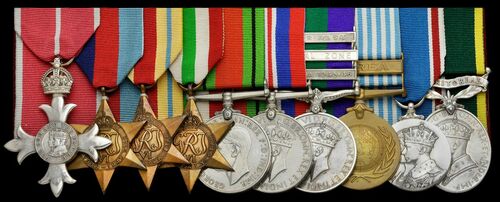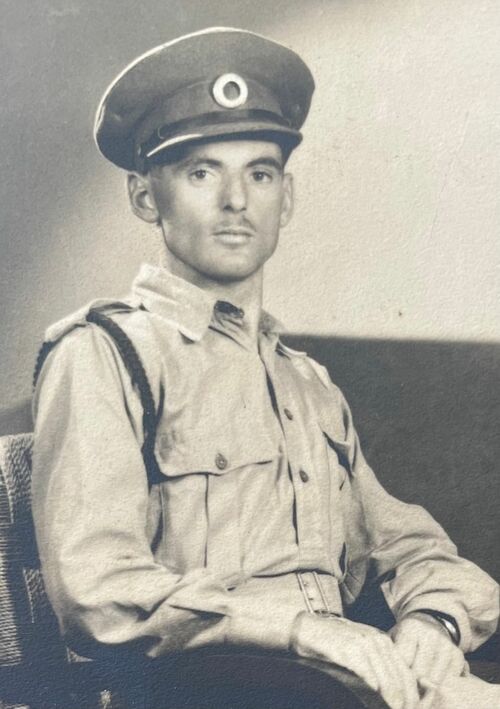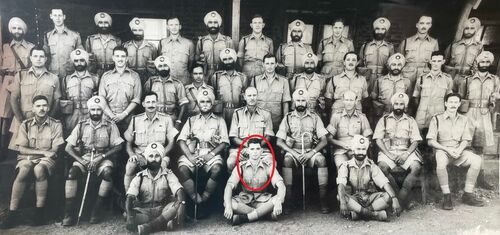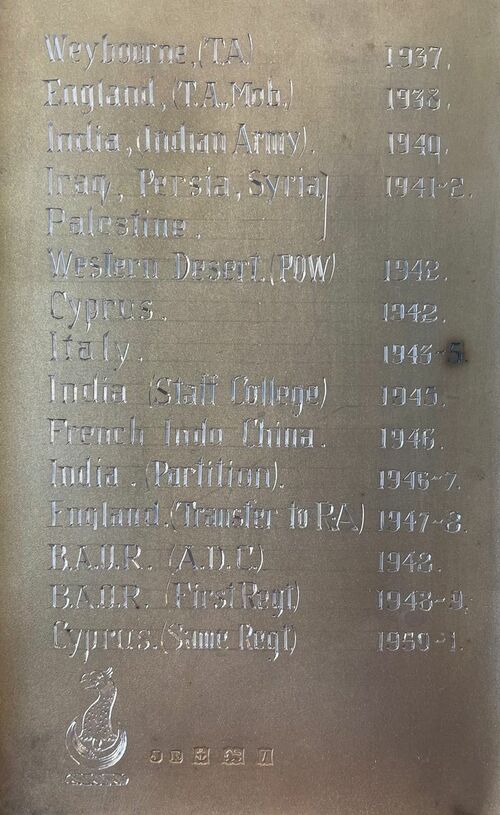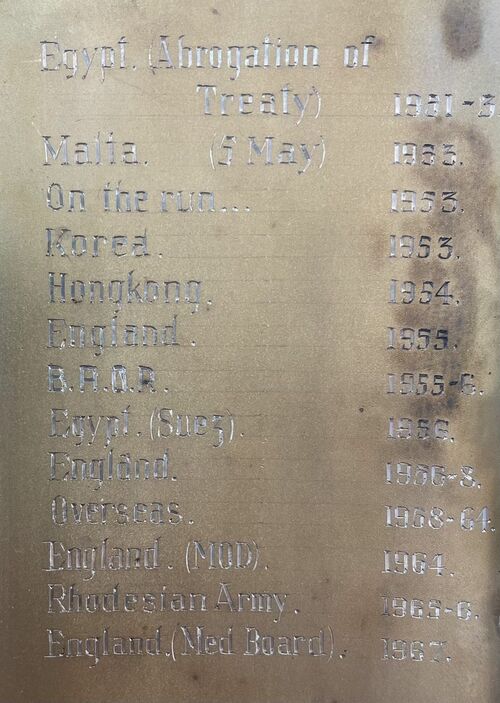Auction: 23001 - Orders, Decorations and Medals
Lot: 377
An outstanding 1945 M.B.E. group of ten awarded to Major P. H. MacDwyer, 2nd Battalion, 11th Sikh Regiment, (Ludhiana Sikhs), Indian Army, who recalled meeting Field Marshal Rommel when he was captured following the battle of Mersa Matruh and who, in a most sporting manner, suggested MacDwyer make his escape; he took that invitation in stealing a German armoured-car and made across the Quattara Depression with his Subedar; he was later wounded in the leg by a Vietminh sniper in French Indo-China during the South East Asia campaign
The Most Excellent Order of the British Empire, M.B.E. (Military) Member's 2nd Type breast Badge, silver; 1939-45 Star; Africa Star; Italy Star; Defence and War Medals 1939-45; General Service 1918-62, 3 clasps, S. E. Asia 1945-46, Canal Zone, Near East (Major P. H. MacDwyer I.A.); U.N. Korea 1950-54; Coronation 1937; Efficiency Medal, Territorial (Capt P. H. MacDwyer Indian Army.), very fine (10)
M.B.E. London Gazette 28 June 1945. The original Recommendation states:
'From June '42 to May '43, this officer carried out the duties of Brigade Intelligence Officer to HQ 25 Ind. Inf. Bde. From May '43 to the present date he has been staff Capt. He has served with this Bde in the Western Desert, Palestine and Cyprus and during the whole operational period of the Bde in Italy. His work has always been of a very high order, and he has always shown the utmost zeal and energy under the most trying conditions.
The success of operations has always largely depended on his work and the very efficient manner in which he has organised the administration within the Bde.
While serving in the central sector where the maintenance of his Bde was over Mountain tracks, he organised jeep and mule convoys under very trying conditions and when he himself was suffering from ill health. It was due to his great energy and organising ability that the forward troops were successfully maintained, and the success of his Bde was made possible.'
Peter Hugh Macdwyer was born 29 July 1920 at Brentford, the son of Dr John MacDwyer.
Enlisting in the Territorial Army in 1937, MacDwyer was commissioned 2nd Lieutenant in the 11th Sikh Regiment on 21 June 1940 and served with them in Iraq and Persia from 30 May 1941-20 June 1942; Cyprus and Palestine from 21 June 1942-27 March 1944; and Italy from 28 March 1944-20 March 1945.
The Ludhiana Sikhs were surrounded at Mersa Matruh on 28-29 June and were forced to break out; they were involved in the disastrous retreat to El Alamein and later served on garrison duty in Cyprus before joining 4th Indian Division in Italy in June 1944.
MacDwyer compiled a fascinating autobiography, which remains unpublished (a copy provided with the Lot), which includes some fine details:
'28 June 1942, My brigade was ordered to be the rear-guard Brigade and my Battalion became the last Battalion and I was the last company to leave. I was now a bit scared.'
He was left in charge of the party of 237 with just one Subadar and one Jemadar and the following day they were 'in the bag':
'I was captured by a German armoured car unit, we came upon a small party of vehicles and I was presented to Field Marshal Rommel. He asked me if I spoke German, I replied in the affirmative and we have a 15-minute conversation. He was a fine looking man, greying slightly, with sharp but friendly eyes. He had a stubborn chin and a tight mouth. He was wearing his inevitable goggles pushed up over his cap, and was very dusty...Turning to an Aide, he ordered me and my men to be taken away to a cage but before being dismissed, he smiled, and shook my hand again, saying:
"I gave special orders for the last man out of Mersa Matruh to be taken Prisoner and brought to me. I wanted to tell him that all rearguards of the British and Allied Armies had fought well. It was easy to find you. Have care and good bye, I don't expect to see you again. Go!"
He then gave me a wide wink and indicated the open desert. It was an invitation to escape, I thought. Anyway, only one Armoured Car and three different guards, all older men, and obviously Reservists, escorted us to the north east, until we camped for the night in the open desert.
That night, I entertained three Germans to the remains of my whiskey, and some rum my Subedar had. He and I had already decided to escape that night, and the men had been warned, but told to do nothing untoward. Late into the night we sat and drank, myself and the Subedar being very modest, as became the 'hosts' and I helped the guards into a false sense of security by telling them several jokes in their own language, which they thought very funny coming from a foreigner...We were away back in a southerly direction before dawn, going by desert compass, towards the Quattara Despression. I rode in the Armoured car, or rather on top of it. Life was happy once again, and the desert was our freedom, and had never looked so good and friendly. It was now 29 June 1942 and we reached the Despression that evening.'
He was also given a special mission to capture the opera singer Benjamino Gigli in Rome to prevent him from being taken by the Germans...
Further brushes came as the War came to a close:
'Within a few days of my arrival [in French Indo-China] there was a ceremonial parade for the surrender of the land Japanese Forces. General Gracey instructed that lots would be drawn amongst his senior officers as to who was to take the very ceremonial surrender of a Japanese Officer's sword, which is of course his honour...to me fell the lot of receiving the sword from the Japanese Chief of Staff to Field Marshal Terauchi. It was the Field Marshal's war and family sword that was handed over. It was a quiet ceremony but touching...This particular sword, which was a Mitsubishi of the 14/15th Century, and had been in the Terauchi family since it was fashioned, and no doubt it represented a part of that family, just like a very valuable heirloom does to an Occidental family. There were rumours that Lord Louis Mountbatten wanted this sword, but General Gracey had refused on the grounds that some honour was deserving to his Officers as well. General Gracey is quoted as saying "...one of my Officers took that surrender, and he shall jolly well keep that sword. It will not leave the Indian Army."'
He also recalled the action in which he was shot by a Vietminh sniper:
'One balmy evening, Major Jock Cameron, one of our Staff Officers, and I were escorting two Nurses from a dance at the Hospital to their quarters a mile or so away, in one of our cars; a captured Japanese Staff car; when a sniper took a few shots at the car. The streets were in the main dark and badly lit, so the car was a good target. One bullet passed through my knee, deflected into the front seat where Jock was driving, and disintergrated into small bits, many of which peppered Jock's posterior. He was naturally put off his stroke, and the crash of the car drowned most of his expressive language, not that the Nurses would have minded that. There was no sign of the sniper naturally, so we motored back to the Hospital but not to dance...and were patched up.
It was ironic, but no doubt decreed by fate, that both of us had survived the horrors of the war unscathed, only to be flawed by a rascally Vietminh sniper. I was very annoyed because the wound effectively prevented my riding a horse again, since I could no longer exert any pressure with my left leg.'
Having served in Korea, at Suez and also with the Rhodesian Army (1965-66), MacDwyer chanced his hand at running the ltings Hotel, Weybourne, Holt in Norfolk. Sadly, it was not to be as he was declared bankrupt. He died, aged just 51, in 1974; sold together with a most attractive silver cigarette case, the inner engraved with his service details, two finely-bound A4 books of research, to include his unpublished autobiography, besides some original photographs.
A portrait of Subadar Jagat Singh, by W. M. Coldstream, is held by the Imperial War Museum (ART LD 3848, refers).
Subject to 20% VAT on Buyer’s Premium. For more information please view Terms and Conditions for Buyers.
Sold for
£2,000
Starting price
£700

